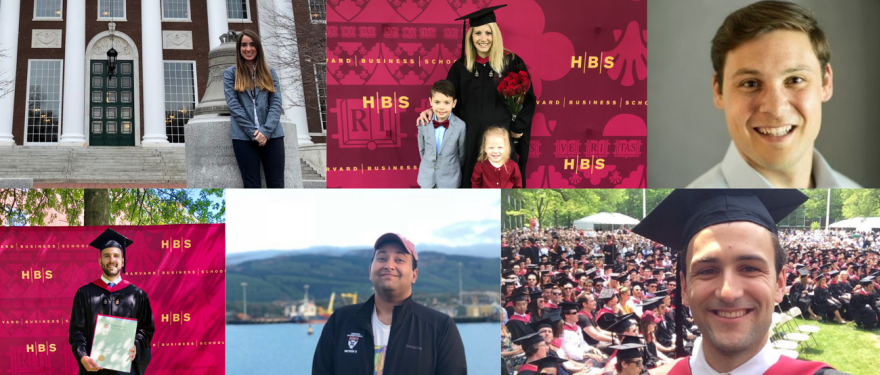How do you know if an MBA is worth it? We asked recent HBS alumni to reflect on their time at—and after—HBS. Here are their thoughts on the business school experience, the value of an MBA degree, and how to best prepare for HBS.
Lindsay McCurren (MBA 2019) is the Founder and CEO of ReMana, Inc.
If you were to describe your HBS experience in 3 words what would they be?
Energizing, eye-opening, and familial.
Was an HBS MBA worth it?
Absolutely. I tell people that all the time. That's not to say all MBAs are worth it for all people. But for me the HBS MBA has given me the best shot at actually starting my own business and I know the alumni network will be invaluable when the time comes for me to do the next thing. Personally, I have friendships that will last a lifetime and that was surprising for me coming in a little older with a family. I have come away much more confident in myself, my life goals and a path to achieve them. I would also never take back the opportunity to have my kids exposed to life living at HBS.
What advice do you have for prospective HBS students?
To consider what they want out of their MBA and really consider if the timing is right. You only get to do the full-time MBA experience once in your life. You want to make sure that you pick the right two years personally and professionally. I wouldn't worry so much about the financial component -- just focus on if the time in your life is right for the type of pivot that you want out of your MBA experience.
Bhargav Srinivasan (MBA 2019) is a Senior Manager at Bain & Company.
If you were to describe your HBS experience in 3 words what would they be?
Unforgettable, reflective, and thought-provoking.
Was an HBS MBA worth it?
It was 100% worth it. For many of us, giving up two years of income is the largest cost of pursuing an MBA. From a professional standpoint, I am already seeing the benefits. The program gave me the chance to reflect and better understand myself. I can stand my own in a room with our senior partners and clients. Personally, the time to explore and meet new people and make lifelong friends will always be worth it.
What advice do you have for prospective HBS students?
Take every opportunity to participate and reflect that you can. HBS gives us a general manager's toolkit, which is in large part about keeping your head on a swivel and being aware of and involved in everything important. However, it's also about taking the opportunity to "stare out of a window" and contemplate the bigger decisions using a keen sense of reflection and introspection.
Zach Sarnoff (MBA 2018) is a Global Program Manager at YouTube.
If you were to describe your HBS experience in 3 words what would they be?
Global, transitional, and eclectic.
Was an HBS MBA worth it?
HBS was a transformative experience for me. Professionally, I pivoted my career from both an industry and geographic perspective. Personally, I made friends across the globe who have aided my personal development and taught me an invaluable amount about the world.
Do you think you could have achieved your short-term goals without an MBA?
Having an MBA validated my ability to think strategically and work with other bright minds from a variety of different backgrounds. When I interviewed at YouTube, I was able to leverage my understanding of tech roles from my HBS classmates. I also leaned on them for interview prep and industry background.
What advice do you have for prospective HBS students?
Think long and hard about what are you looking to get out of an MBA. Think about where you want to be in 5, 10, 25 years and how an MBA can help you achieve those goals. Look at your desired field and reach out to HBS alumni in that field who are willing to share how an MBA shaped their career.
Valentina Toll Villagra (MBA 2020) is the CEO of allspice.io.
If you were to describe your HBS experience in 3 words what would they be?
Vibrant, enlightening, and communal.
Was an HBS MBA worth it?
100%! I started at HBS with a strong technical background, but very little exposure to the business side of running a company and the venture ecosystem of running a startup. At HBS I learned the building block principles of any company as well as the specifics of entrepreneurship. While in school, I met my co-founder and we ran the early experiments of what would become AllSpice through many of the HBS programs-- we built our first pitch deck for The New Venture Competition and our first advisor was from the Rock Accelerator! On the personal side, the MBA Program helped me confirm my choice of going into startups. Entrepreneurship is not just a career choice but a lifestyle one as well, and getting to try it while in school (a pretty “safe” space to try and fail) gave me the certainty that I wanted to commit to it after graduation, and for the long haul.
What advice do you have for prospective HBS students?
Think ahead of time if you have specific goals you want to achieve during the MBA. For me, it was getting to the startup world. There is an incredible amount of resources at HBS, and they are all world-class. It’s easy to feel torn and pulled in many different directions while deciding how to spend your time. Coming in with clarity will help you focus in the midst of so many options and keep you on the path to your goals.
Martin Hudak (MBA 2016) is a Global Strategy Director at PepsiCo.
If you were to describe your HBS experience in 3 words what would they be?
Impactful, life-changing, and fulfilling.
Was an HBS MBA worth it?
I think my MBA was definitely worth it, and two reasons come to mind. First, HBS really helped me to reflect. I was able to learn how to better understand myself, how to trust myself, and get more into what makes a great leader. I was able to think longer-term not only about my career but also how I can have a wholesome life. Second, I met amazing people from whom I can learn, who can push me forward as they are always pushing themselves, and who I can call for advice. I made great friends from my MBA class and became part of a lifelong community.
Do you think you could have achieved your short-term goals without an MBA?
No. I recently moved from BCG to PepsiCo and my MBA from HBS played many roles during the transition process. First, the power of our alumni network. I reached out to many alumni, both those who achieved my long-term goals and those in my target companies, and got invaluable insights and connections that helped narrow down options and pushed me forward. I also joined alumni events organized by the HBS Club of New York, which were helpful for networking and inspiration. Second, I used HBS Career & Professional Development resources. I utilized their online content and also met with career coaches to discuss various aspects of my job search process. Lastly, I had the confidence to handle the interviews and the work because of having gone through countless case studies at HBS. I even went back to some cases to refresh concepts we covered at HBS!

Carl Culicchia (MBA 2016) is a Principal at SV Health Investors.
If you were to describe your HBS experience in 3 words what would they be?
Grounding, transformative, and rich.
Was an HBS MBA worth it?
I graduated from a liberal arts undergrad with a major in American Studies. Despite working in private equity for a few years pre-MBA, I felt I needed a proper business education. HBS provided me with the technical and qualitative skills necessary to advance my career in private equity. More importantly, HBS endowed me with the critical reasoning and communication skills to tackle any real-world case that I encounter (In this way, the value of the HBS MBA is less obvious). I have confidence knowing that, no matter what problems or situations I find myself in, I have the skillsets to figure it out and succeed. Finally, there is a difficult-to-quantify networking element that accrues to your benefit over time. The ability to leverage my sectionmates' perspectives and wisdom has helped to advance my own personal and professional development.
What advice do you have for prospective HBS students?
The most valuable asset I gained at HBS was the confidence to be myself and chase goals that felt authentic to me instead of pursuing goals for external validation. In this way, I was endowed with the leadership skills that, today, enable me to articulate a clear vision and inspire others to align with this vision. To me, that is the definition of authentic leadership. Don't be afraid to take the time to figure out who you want to be, as, only then, will you figure out what type of leader you can become.

